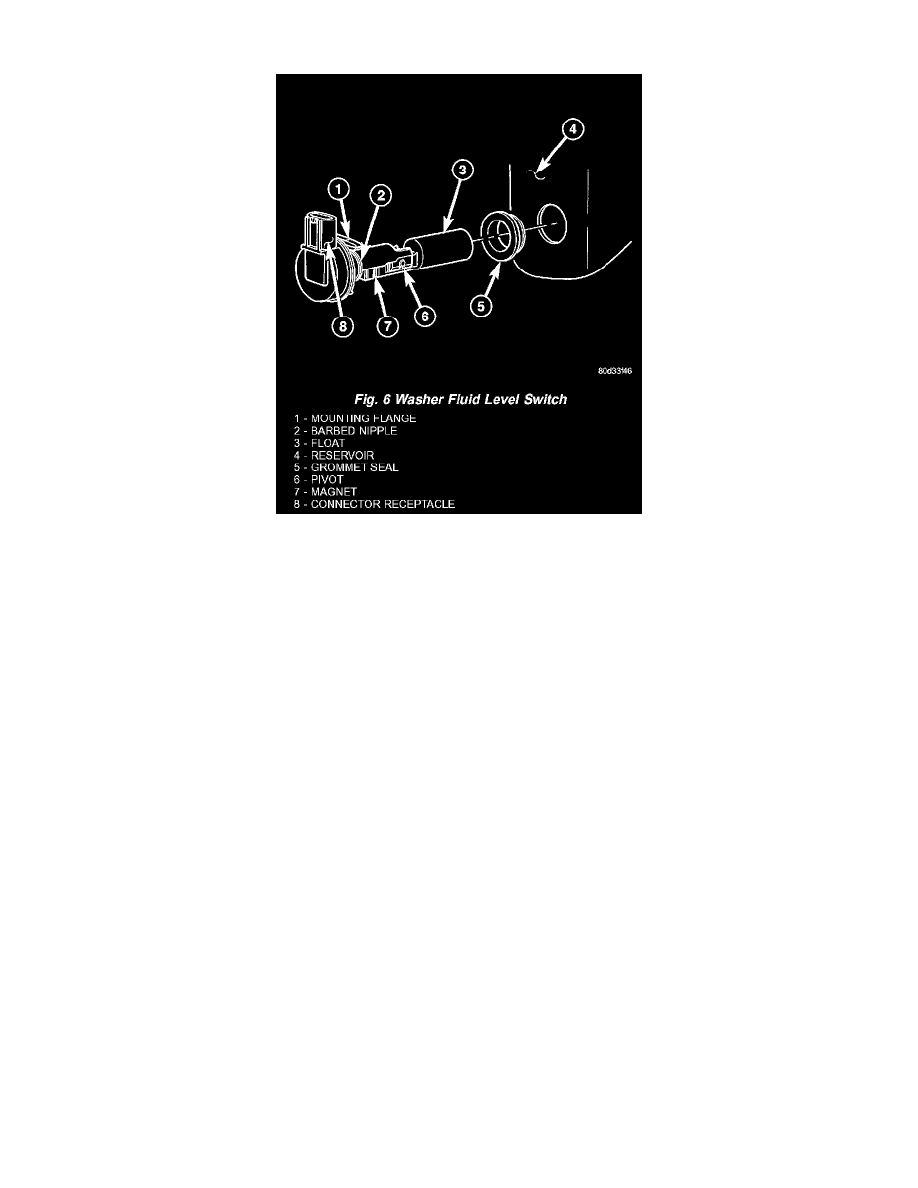RAM 3500 Truck 2WD V8-5.7L VIN D (2003)

Washer Fluid Level Switch: Description and Operation
Fig.6 Washer Fluid Level Switch
WASHER FLUID LEVEL SWITCH
The washer fluid level switch is a single pole, single throw reed-type switch mounted on the outboard side of the of the washer reservoir in the engine
compartment. Only the molded plastic switch mounting flange and the integral connector receptacle are visible when the switch is installed in the
reservoir. A short nipple formation extends from the inner surface of the switch mounting flange, and a barb on the nipple near the switch mounting
flange is pressed through a rubber grommet seal installed in the mounting hole of the reservoir.
A small, molded plastic float has two pivot pins near its center that are snapped into two receptacles near the ends of two stanchions that extend
toward the float from the switch nipple formation. A small magnet is secured within the end of the float nearest the switch nipple formation, and a reed
switch is concealed within the nipple. A diagnostic resistor is connected between the two switch terminals within the switch mounting flange. The
washer fluid level switch cannot be adjusted or repaired. If faulty or damaged, the switch must be replaced.
The washer fluid level switch uses a pivoting, oblong float to monitor the level of the washer fluid in the washer reservoir. The float contains a small
magnet. When the float pivots, the proximity of this magnet to a stationary reed switch within the nipple formation of the switch changes. When the
fluid level in the washer reservoir is at or above the float level, the float moves to a vertical position, the influence of the float magnetic field is
removed from the reed switch, and the normally open reed switch contacts open. When the fluid level in the washer reservoir falls below the level of
the pivoting float, the float moves to a horizontal position, the influence of the float magnetic field is applied to the reed switch, and the contacts of the
normally open reed switch close.
The washer fluid level switch is connected to the vehicle electrical system through a dedicated take out and connector of the right (except V-10 and
diesel engines) or left (V-10 and diesel engines only) headlamp and dash wire harness. The switch is connected in series between a clean ground
output of the Front Control Module (FCM) on a sensor return circuit and the washer fluid switch sense input to the FCM. When the switch closes, the
FMC senses the ground on the washer fluid switch sense circuit. The FMC is programmed to respond to this input by sending an electronic washer
fluid indicator lamp-on message to the instrument cluster over the Programmable Communications Interface (PCI) data bus. The instrument cluster
responds to this message by illuminating the washer fluid indicator and by sounding an audible chime tone warning.
The washer fluid level switch may be diagnosed and tested using conventional diagnostic tools and procedures. However, conventional diagnostic
methods may not prove conclusive in the diagnosis of the instrument cluster, the Front Control Module (FCM), or the electronic message inputs to or
outputs from the instrument cluster and the FCM that control the operation of the washer fluid visual and/or audible indicators. The most reliable,
efficient, and accurate means to diagnose the washer fluid level indicator, the instrument cluster, the FCM, or the electronic message inputs and
outputs related to the washer fluid indicator requires the use of a DRBIII scan tool. Refer to the appropriate diagnostic information.
